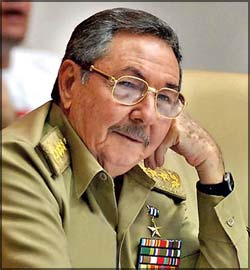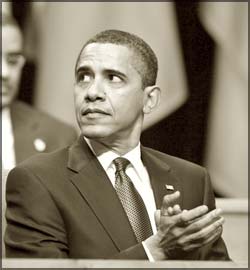|
US - Cuba relations:
Light at the end of the tunnel?
On April 17-19, 2009 President of the United States and Heads of
State of 34 of the 35 nations in Latin America and the Caribbean met at
the Summit of the Americas convened by the Organization of American
States in Trinidad and Tobago.
The only exception was Cuba whose membership of the OAS was suspended
since 1962, following the triumph of the Cuban Revolution.
|

Raul Castro |
|

Barak Obama |
Ironically it was on the same dates April 17-19 in 1961 that a US
instigated Bay of Pigs invasion of Cuba was launched and suffered a
humiliating defeat, the first defeat of America in the Americas.
Though excluded, it was Cuba that dominated the OAS Summit. All Latin
American and Caribbean states were unanimous in their desire to lift the
suspension of Cuba.
It was only a few days ago that the 27 member states of the Latin
American and Caribbean Economic System (SELA) declared in favour of the
lifting of the 50-year-old US blockade on Cuba.
SELA was soon joined by the six member Bolivarian Alternative for
Latin America (ALBA) on April 17.
Once it was clear that the fulcrum on which US-Latin American
relations hinged was Cuba, all eyes were on US President Obama and how
he would react. President Obama was voted to power on a mandate of
Change.
Change he promised and Change he has to deliver. But will it
encompass foreign policy, especially in relation to Latin America? The
United States has considered Latin America as its backyard and
consistently pursued a policy of dominance in the region.
The infamous Monroe Doctrine called for an end to outside involvement
in the affairs of the region.
As regards Cuba, its interests were much more. It not only frustrated
the victory of the Second War of Independence initiated by Cuban Apostle
Jose Marti by landing its troops in Santiago and preventing a rout of
the Spanish army which was about to capitulate before the Mambi
fighters, but also imposed a humiliating Platt Amendment to the
Constitution of Cuba under which gave the US the right to intervene in
Cuba at will.
Attempts were even made to buy the island from the Spaniards even
earlier.
It was the loss of their “traditional” right of dominance, the
assertion of its sovereignty by Cuba following the victory of the Cuban
Revolution of January 1, 1959 that made the United States to go all out
to destroy the independence and sovereignty of Cuba and subject it to
her will.
It refrained from nothing in its effort to crush the Cuban
Revolution. Covert and overt aggression including armed invasion,
conspiracies to assassinate leaders of the Cuban Government and state
leaders (there were over 600 attempts on the life of Fidel Castro), use
of biological warfare, most heinous terrorism and above all, an
encompassing economic blockade that virtually amounted to genocide by
denied essential foods and medicine to the population were all advocated
and implemented to the letter. The economic blockade alone cost Cuba
over US $93 billion in damages.
The blockade has no been able to weaken the resolve of the Cubans to
defend their sovereignty or their social system.
On the other hand, it has cost the United States too in lost economic
and trade opportunities. At present, large sections of the US
population, including the Cuban American exiles and their dependents
favour the lifting of the blockade.
According to the Foreign Affairs magazine published by the
prestigious Council on Foreign Relations, Three panels of experts who
forwarded their proposals on the development of US-Latin American
relations have recommended the lifting of the blockade.
In Trinidad and Tobago, President Barack Obama said: “I know there is
a longer journey that must be travelled in overcoming decades of
mistrust, but there are critical steps we can take toward a new day, ..I
am prepared to have my administration engage with the Cuban Government
on a wide range of issues - from human rights, free speech, and
democratic reform to drugs, migration and economic issues.”
The reply from President Raul Castro was also in similar vein. He
said: “We are willing to discuss everything, human rights, freedom of
press, political prisoners, everything, everything, everything they want
to talk about, but as equals, without the smallest shadow cast on our
sovereignty, and without the slightest violation of the Cuban people’s
right to self-determination.”
On the eve of the Trinidad and Tobago Summit, President Obama eased
restrictions on Cuban-Americans’ freedom to visit and send money to
relatives in Cuba. This was an election pledge.
This is a little step in the right direction. It is not enough and
has come far too late. The decision to engage in talks is more positive,
if pursued sincerely.
One thing, however, has to be underlined. The talks should be on the
basis of respect for each other’s sovereignty.
There cannot be any conditions or admonitions to “behave”. It is not
only whimsical to expect “regime change” but also anti-democratic. Cuban
people should be allowed to decide their own fate.
There is no going back to pre-revolutionary US dominance. The
blockade has to be lifted. One should keep in mind that 185 of 192
members of the United Nations have asked for its removal. The illegally
held Guantanamo Base should be returned to Cuba.
Five Cuban patriots who are unjustly held in US prisons for fighting
against terrorism should be released. Posada Cariles, the number one
terrorist in Latin America who blew up a Cuban civilian airplane with 70
odd passengers on board (according to his own boast, in addition to
evidence gathered) should be tried in the United States or extradited to
Nicaragua to stand trial for crimes committed in that country. Then only
the “New direction” sought by President Obama could materialize. |



